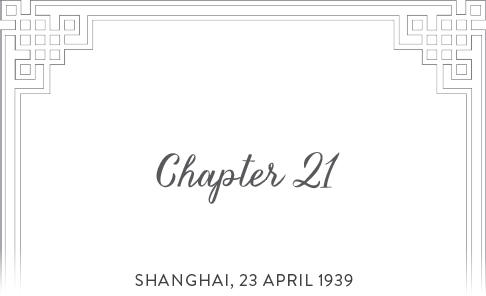
23 April 1939
Papa gave me this diary for my birthday. Actually, I chose it from the stationer on Avenue Joffre, when I told him I hadn’t been sleeping because of Daniel. We’ve still had no word, but I’m sure we will soon. We can’t send so many letters with no reply forever.
I will confide here my stories of Shanghai so I can remember them for Daniel when he comes.
We went to the home of Sephardic Jews for Passover and Mutti said I was welcome to bring Li for company. Of course, I wanted Nina as well but she had to spend the holy day with her uncle.
You would not believe the houses here. This one was a grand Spanish-style villa (according to Papa) with terracotta tiles and archways and columns over porticoes that looked like whipped cream. The black wrought-iron balconies were very modern with tiny diamond patterns and a treble clef. It made me think of Daniel and Benjamin. Either side of the main entrance were two trees clipped into giant round balls, and there were miles of flat open lawn where the adults play croquet, a British game where you hit balls around with wooden mallets. The lawn was the perfect green for lying on (Mutti wouldn’t let us) with random clumps of grasses and giant rocks in the corner. It’s a bizarre arrangement that I am noticing in many of the Shanghai parks. A row of fancy black cars lined the driveway. They were so clean and shiny we could see our reflections in them.
The estate was protected from the street by a high brick wall, and along the fence were lines of feathery trees propped up with special bamboo tripods. Clusters of tiny white flowers filled the garden with a tangy sweetness, a bit like an orange. Li’s papa makes a strong tea from the dried leaves, and her amah makes a sticky rice cake cut into diamonds from the black fruit that look a little like olives.
The mansion had over twenty bedrooms. (Li and I ran around and counted upstairs before joining everyone downstairs to listen to a little boy sing ‘Ma Nishtana’.)
Now back to the feast. It was different to all the other Seder meals I’ve eaten. We had bowls of fluffy white rice, dried beans and lentils, as well as red, yellow and green peppers stuffed with rice.
My favourite food was a dip called baba ghanoush, which is soft-cooked aubergine with lemon and pepper. There was also a dip made from chickpeas called hummus and a chopped salad with tomatoes, cucumbers and mint and parsley. The chicken soup had lemon, and you could add some strange pickled lemon on the side. It still had the matzo balls, though. Li hadn’t tried them before and she had two serves. And these were just the entrees!
On the table with the mains were baked fish covered with lemon slices and parsley, and a bright yellow grain they called couscous, which was both crunchy and soft at the same time. No gefilte fish! There was also a beef brisket that Mutti said had been cooking for two days and it was so soft you served it with a spoon. It tasted a bit of lemon too.
I had a sip of Mutti’s coffee and it tasted like dirt to me. It’s thick, like honey, and they drink it from a tiny cup with no whipped cream or cinnamon. Instead they used cardamom. Papa loved it, Mutti hated it.
But the dessert table! I have never seen one like it. I wish I could post some to Daniel.
Instead of the charoset being made from apples and cinnamon, they make it with dates and it is much thicker. There are sticky baklava squares made with pastry and pistachios, which ooze with honey, and lemon macaroons shaped like crescents and dusted with sugar. Li and I filled our plates and ran out to the garden and ate dessert next to the large pond, throwing the crumbs onto the glassy surface to watch giant goldfish jump.
Mutti says food is getting more expensive here so we mustn’t waste it. (I didn’t tell her about feeding the fish.) The Japanese are stopping rice and other food deliveries coming in from the farmlands around Shanghai.
Now I am home and tucked in my bed, it seems strange to me we went out for the meal. When there was a war in Egypt in ancient times, they passed over the houses of Jews to make sure they were not killed. But now the opposite is happening.
I can’t help but overhear the adults discussing the Führer and the Werhmacht’s march into Czechoslovakia and Italy’s takeover of Albania and I know how lucky we are to be away from Europe. But what does it mean to be lucky when one brother is dead and we have no news of the other? Poor Nina has no-one, as her uncle has to work all the time to earn enough to feed them and they will need new boots this winter.
How is it possible to be fortunate and not feel the deep guilt that accompanies such luck? I am very sorry to say I snuck ten of Mutti’s valerian drops last night as I brushed my teeth. I can’t tell if it helped me to sleep.
Until tomorrow,
Romy
P.S. On the radio last night the newsreader suggested Hitler may have ordered his generals to prepare for a war. I’m not sure if that means we can go and get Daniel, or if he will be released to come to us? What happens to our family if there is a war?